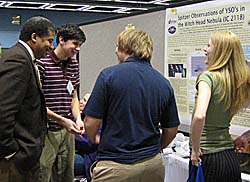| Tim Spuck's students discuss their search for T Tauri stars with renowned astrophysicist Neil deGrasse Tyson at the American Astronomical Society conference in January 2007. (Photo credit: Wikipedia) |
The more we understand about science and its complexities, the more important it is for scientific data to be shared openly. It’s not useful to have ten different labs doing the same research and not sharing their results; likewise, we’re much more likely to be able to pinpoint diseases if we have genomic data from a large pool of individuals. Since 2004, we’ve been focusing our efforts to expand the use of Creative Commons licenses to scientific and technical research. (Emphasis my own.)There are new models of scientific publishing that include openness. Even Nature is taking advantage of open licenses in a limited way.
Another exciting development is the Directory of Open Access Journals which searches 5,622 journals at the full-text article level.
Everyone benefits from open access to data and information. Lets serve the research, not the business models. As the Berlin Declaration on Open Access puts it open access scientific literature should be publicly available, free of charge, and on the Internet "so that those who are interested can read, download, copy, distribute, print, search, refer to and, in any other conceivable legal way, use full texts without encountering any financial, legal or technical barriers other than those associated with Internet access itself."


No comments:
Post a Comment